
Article describes work and personal management techniques to help achieve work-life-balance
- Subject:
- Career and Technical Education
- Material Type:
- Reading
- Reference Material
- Author:
- David Lavenda
- Date Added:
- 05/23/2018

Article describes work and personal management techniques to help achieve work-life-balance

This activity includes an assessment, analysis, and action tool that can be used by classrooms to promote understanding of how the complex current issues of energy, pollution, supply and consumption are not just global but also local issues.
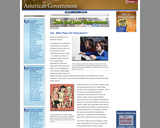
Public education is the single largest expenditure for state and local governments across the nation. Yet it is arguably the most criticized. Many people charge that public schools are faltering and that American academic achievements are far behind those in other countries. In recent years, many states and localities have experimented with improving public schools.

Article describes how to behave professionally in a working environment with coworkers, clients, and customers
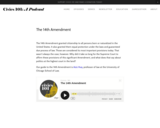
The 14th Amendment granted citizenship to all persons born or naturalized in the United States. It also granted them equal protection under the laws and guaranteed due process of law. Those are considered its most important provisions today. That wasn't always the case, however. Why did it take so long for the Supreme Court to affirm these provisions of this significant Amendment, and what does that say about politics at the highest court in the land?
Our guide to the 14th Amendment is Aziz Huq, professor of law at the University of Chicago School of Law.
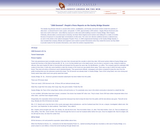
The deadly lung disease silicosis is caused when miners, sandblasters, and foundry and tunnel workers inhale fine particles of silica dust--a mineral found in sand, quartz, and granite. In 1935, approximately 1,500 workers--largely African Americans who had come north to find work--were killed by exposure to silica dust while building a tunnel in Gauley Bridge, West Virginia. Ordinarily, silicosis takes a several years to develop, but these West Virginia tunnel workers were falling ill in a matter of months because of exposure to unusually high concentrations of silica dust. The crisis over silicosis suddenly became a national issue, as seen in this article in the radical newspaper Peoples' Press . In 1936 congressional hearings on the Gauley Bridge disaster, it was revealed that company officials and engineers wore masks to protect themselves when they visited the tunnel, but they failed to provide masks for the tunnelers themselves, even when the workers requested them.

You are going to love this video lesson from my friend Cindy West of Our Journey Westward. My elementary kids absolutely adore her No Sweat Nature Study Live lessons twice a month. Today, she will teach you about Music in Nature, specifically bird calls and bird songs.
![17 Top Internal Communication Channels [Infographic] · CMBell](https://img.oercommons.org/160x134/microsite-wi-prod/media/screenshots/a3a04295da22dc3f87a4f3ed67bd02b56bd42d03639bc0f353fc382d5169218f.png)
Infographic explains various internal communication channels and how to use them
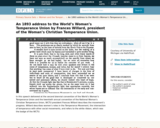
This primary source is the speech given by Francis Willard, President of the World's Women's Temperance Union, at the organization's 20th annual convention. In it, she details women's roles in the Temperance Movement and how the Temperance Movement intersected with other social movements.
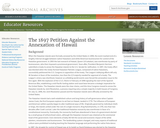
This site recounts the struggle for control of Hawaii between native Hawaiians and American business interests in the late 1800s. This 1897 petition and a lobbying effort by native Hawaiians convinced the U.S. Congress not to annex the islands. But months later the U.S.S. Maine exploded in Havana and the Spanish-American War began. The U.S. needed a mid-Pacific fueling station and naval base.
Primary source images, standards correlation, and teaching activities are included in this resource.
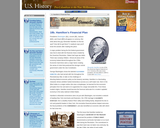
Presidents Washington ($1), Lincoln ($5), Jackson ($20), and Grant ($50) all appear on currency. But what about this guy Alexander Hamilton on the ten-spot? How did he get there? A sawbuck says you'll know the answer after reading this piece.
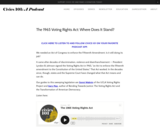
We needed an Act of Congress to enforce the Fifteenth Amendment. Is it still doing its job?
It came after decades of discrimination, violence and disenfranchisement -- President Lyndon B. Johnson signed the Voting Rights Act in 1965, "an Act to enforce the fifteenth amendment to the Constitution of the United States." That Act worked. In the decades since, though, states and the Supreme Court have changed what that Act means and can do.
Our guides to this sweeping legislation are Sonni Waknin of the UCLA Voting Rights Project and Gary May, author of Bending Towards Justice: The Voting Rights Act and the Transformation of American Democracy.
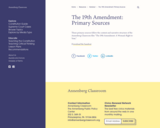
These primary sources follow the content and narrative structure of the Annenberg Classroom film “The 19th Amendment: A Woman’s Right to Vote.”
Handout includes poems, songs, photos, papers, as well as highlights important people and events associated with the 19th amendment.
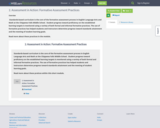
Standards-based curriculum is the core of the formative assessment process in English Language Arts and Math at the Chippewa Falls Middle School. Student progress toward proficiency on the established learning targets is monitored using a variety of both formal and informal formative practices. The use of formative practices has helped students and instructors determine progress toward standards attainment and the meeting of student learning goals.Read more about these practices in the module.

This is a task from the Illustrative Mathematics website that is one part of a complete illustration of the standard to which it is aligned. Each task has at least one solution and some commentary that addresses important asects of the task and its potential use. Here are the first few lines of the commentary for this task: First pose the question: Here are four triangles. What do all of these triangles have in common? What makes them different from the figures that are no...
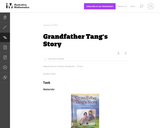
This is a task from the Illustrative Mathematics website that is one part of a complete illustration of the standard to which it is aligned. Each task has at least one solution and some commentary that addresses important asects of the task and its potential use. Here are the first few lines of the commentary for this task: Materials * A copy of Grandfather Tang's Story by Ann Tompert * One set of tangrams for each student (see note in commentary) * A set of tangrams for t...
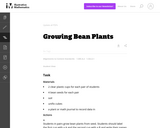
This is a task from the Illustrative Mathematics website that is one part of a complete illustration of the standard to which it is aligned. Each task has at least one solution and some commentary that addresses important asects of the task and its potential use. Here are the first few lines of the commentary for this task: Materials - 2 clear plastic cups for each pair of students - 4 bean seeds for each pair - soil - unifix cubes - a plant or math journal to record data ...
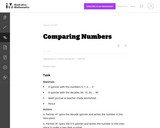
This is a task from the Illustrative Mathematics website that is one part of a complete illustration of the standard to which it is aligned. Each task has at least one solution and some commentary that addresses important asects of the task and its potential use. Here are the first few lines of the commentary for this task: Materials A spinner with the numbers 0, 1, 2, ... 9 A spinner with the decades 00, 10, 20, ... 90 Math journal or teacher-made worksheet Pencil Actions...

This is a task from the Illustrative Mathematics website that is one part of a complete illustration of the standard to which it is aligned. Each task has at least one solution and some commentary that addresses important aspects of the task and its potential use.
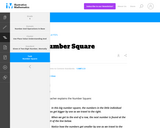
This is a task from the Illustrative Mathematics website that is one part of a complete illustration of the standard to which it is aligned. Each task has at least one solution and some commentary that addresses important aspects of the task and its potential use.